'Belt-Road' to exchange goodwill with trade
Updated: 2015-04-21 06:35
By PAUL WELITZKIN in New York(China Daily USA)
|
||||||||
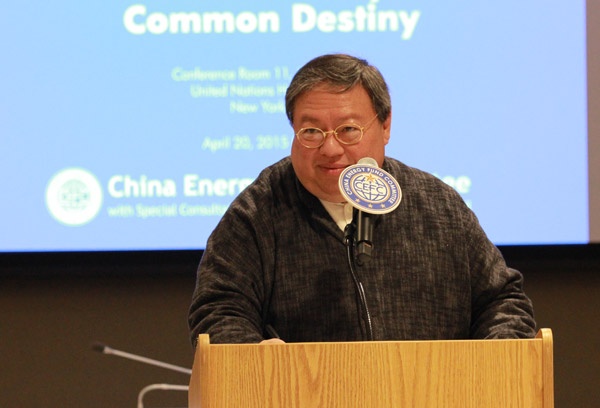 |
|
While the first Silk Road traded tea, spices and silk, this plan, also known as the "One Belt, One Road" initiative, will also exchange values, kindness and perspectives, HO C.P. Patrick, deputy chairman and secretary general of the China Energy Fund Committee told A China Story III: From Diversity, Tolerance to a Community of Common Destiny conference at the United Nations in New York on Monday. PROVIDED TO CHINA DAILY |
China's Silk Road Economic Belt initiative will establish new trade routes linking Asia, Europe and Africa, and also promote goodwill through economic development and cooperation, said HO C.P. Patrick, deputy chairman and secretary general of the China Energy Fund Committee.
While the first Silk Road traded tea, spices and silk, this plan, also known as the "One Belt, One Road" initiative, will also exchange values, kindness and perspectives, Patrick said at a conference on Monday held at the United Nations in New York. Called A China Story III: From Diversity, Tolerance to a Community of Common Destiny, the conference was sponsored by the energy fund committee.
Chinese President Xi Jinping unveiled the initiative in 2013 to establish new routes linking Asia, Europe and Africa. It has two parts — a new "Silk Road Economic Belt" linking China to Europe that cuts through mountainous regions in Central Asia; and the "Maritime Silk Road" that links China's port facilities with the African coast and then pushes up through the Suez Canal into the Mediterranean Sea.
The initiative calls for infrastructure projects that will boost trade, economic development and energy security in the region. Last November China committed $40 billion to the project and in December it was officially opened.
Although it is likely to draw early interest from countries located along the line of development, Wang Xuexian, China's former ambassador to South Africa and vice-president of the United Nations Association of China, said the initiative is open to all countries.
"We welcome everyone who wishes to join. We especially welcome major powers like the US," he said. "We sincerely hope that India will find it beneficial to join this initiative."
He Fan, senior research fellow at the Institute of World Economics and Politics of the Chinese Academy of Social Sciences, said the belt road initiative is part of a process of China increasing its overseas direct investment (ODI).
"China's ODI rose to nearly $108 billion in 2013 from $2.7 billion in 2002," said Fan. He said the largest recipient sector for Chinese ODI is business services while mining is second.
Fan said many are concerned about the role of China's state-owned enterprises. "The SOEs do play an important role in the Chinese economy. However, we have a lot of private enterprises."
Other concerns Fan addressed included China's demand for natural resources. "China is not buying up all the resources as some of the investment is misunderstood. If Sinopec invests in African oil fields, it may be better for Sinopec to ship the oil to Europe," he said.
Shi Ze, a senior research fellow and director of the center for international energy strategies at the China Institute of International Studies, said the initiative will help China improve regional and global relationships.
"'One Belt, One Road' lays a strong foundation for China's relationship with countries along the route. China will bring more countries on board through bilateral cooperation," Ze said.
Patrick dismissed criticism that the initiative is a Chinese version of the Marshall Plan (enacted by the US in 1947 as a way to help rebuild Europe after World War II) and seeks to establish Chinese influence in the Eurasian heartland by quoting Chinese Foreign Minister Wang Yi.
"China's Belt and Road initiative is both much older and much younger than the Marshall Plan. The initiative is older because they embody the spirit of the ancient Silk Road, which had a history of more than 2,000 years. The initiative is younger because it is born in the age of globalization. It is the product of inclusive cooperation, not a tool of geopolitics, and must not be viewed with the outdated Cold War mentality," Wang said.
At the opening of the conference, Sam K. Kutesa, president of the UN General Assembly, lauded China for promoting economic cooperation and development.
"I was happy to learn that through land and maritime interconnection, China's 'One Belt and One Road' initiative aims at integrating Eurasia's economic development and also interconnectivity and cooperation with Africa. It is my hope that this initiative will facilitate practical economic cooperation and development of all countries along the routes, most of which are developing countries," Kutesa said.
paulwelitzkin@chinadailyusa.com
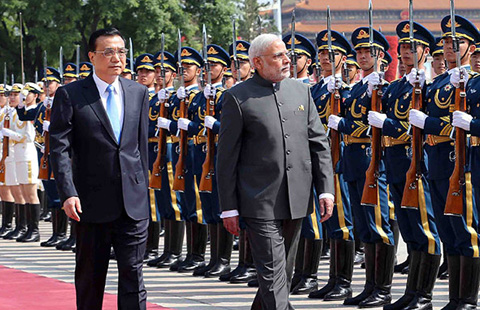
 Premier Li holds welcoming ceremony for Indian PM Modi
Premier Li holds welcoming ceremony for Indian PM Modi
 Saved by a sunroof
Saved by a sunroof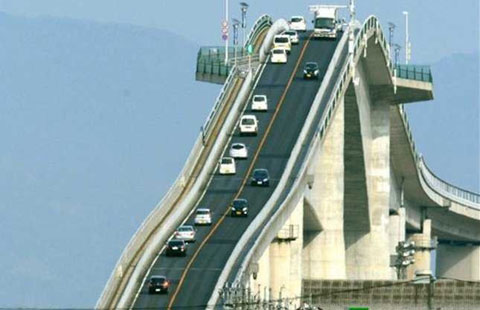
 Unusual but true: Japan's bridge a nightmare for drivers
Unusual but true: Japan's bridge a nightmare for drivers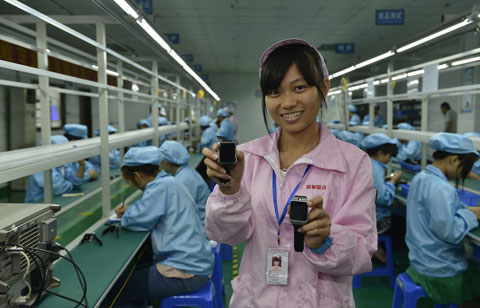
 A look into Shenzhen smart watch assembly line
A look into Shenzhen smart watch assembly line
 Cannes Film Festival unrolls star-studded red carpet
Cannes Film Festival unrolls star-studded red carpet
 Amazing artworks in supermarkets
Amazing artworks in supermarkets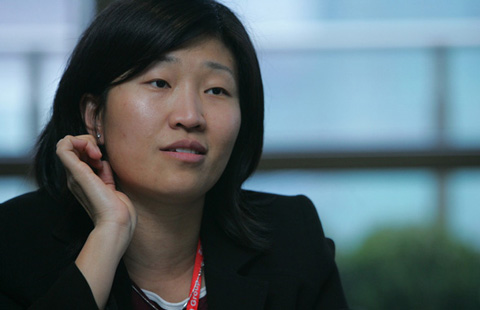
 Top 10 venture investors in the world
Top 10 venture investors in the world
 Ten photos you don't wanna miss - May 14
Ten photos you don't wanna miss - May 14
Most Viewed
Editor's Picks

|

|

|

|

|

|
Today's Top News
Premier Li says talks with Modi 'meet expectations'
A bilateral treaty's potential praised
PBOC confirms debt-swap plan
US and Cuba to hold another round of talks
US would consider military force to defend Gulf nations: Obama
Xi to give Modi a hometown welcome
Aviation, railway top Li's agenda for Latin America
Cui rebuffs US stance on
S. China Sea
US Weekly

|

|






